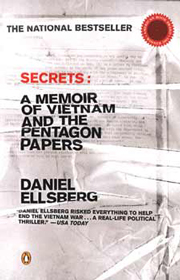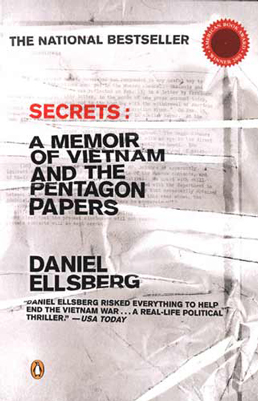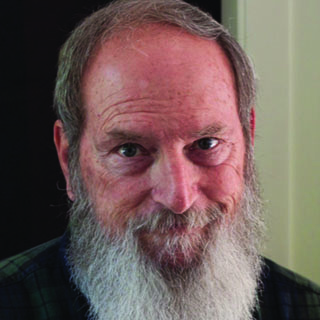Daniel Ellsberg, Ph.D. was the first person in America to be arrested for leaking top secret documents which became known as the "Pentagon Papers." In so doing, he set in motion actions that led to the end of the Vietnam War and the resignation of President Richard Nixon. He is the author of four books: Papers on the War (1971), Risk, Ambiguity and Decision (2001), Secrets: A Memoir of Vietnam and the Pentagon Papers (2002), and The Doomsday Machine: Confessions of a Nuclear War Planner (Dec. 2017). He is also the subject of the 2010 Academy Award nominated feature length documentary film "The Most Dangerous Man in the World." He is portrayed in Steven Spielberg's film "The Post," starring Tom Hanks and Meryl Streep, which centers on the Washington Post’s decision to publish the classified Pentagon Papers.
In December 2006 he was awarded the 2006 Right Livelihood Award, known as the “Alternative Nobel Prize,” in Stockholm, Sweden, “. . for putting peace and truth first, at considerable personal risk, and dedicating his life to inspiring others to follow his example.”
In October of 1969, Dr. Ellsberg began smuggling out of his office and xeroxing the seven-thousand page top-secret study of U.S. decision making in Vietnam, known as the Pentagon Papers, with the intent of revealing these secrets to Congress and the American public, and first gave it to the Senate Foreign Relations Committee. In 1971, he gave it to the New York Times, then to the Washington Post and 17 other newspapers. His trial, on twelve felony counts posing a possible sentence of 115 years, was dismissed in 1973 on grounds of governmental misconduct against him, which led to the convictions of several White House aides and figured in the impeachment proceedings against President Nixon. The story of the Pentagon Papers is being made into a feature film by Steven Spielberg and will star Tom Hanks and Meryl Streep. "A timely film about the vital role of the press in keeping government honest..." — Deadline Hollywood
Ellsberg began his career as the coldest of the cold warriors, a U.S. Marine company commander, a Pentagon official, an analyst at the Rand corporation, and a staunch supporter of America's battle against Communist expansion. None of this hinted at the role Ellsberg would later play in ending the war in Vietnam. His book SECRETS: A Memoir of Vietnam and the Pentagon Papers (Penguin) was the first account by Ellsberg of how and why he revealed these papers, and how his actions helped alter the course of U.S. history. It is the story of how Ellsberg underwent a grave change in conscience, and how this change stemmed precisely and logically from his work in the government and at Rand. Covering the decade between his entry into the Pentagon and Nixon's resignation, SECRETS is Ellsberg's vivid and meticulously detailed insider's account of the secrets and lies that shaped American foreign policy during the Vietnam era.
Ellsberg was born in Chicago in 1931. After graduating from Harvard in 1952 with a B.A. summa cum laude in Economics, he studied for a year at King’s College, Cambridge University, on a Woodrow Wilson Fellowship. Between 1954 and 1957, Ellsberg spent three years in the U.S. Marine Corps, serving as rifle platoon leader, operations officer, and rifle company commander.
From 1957-59 he was a Junior Fellow in the Society of Fellows, Harvard University. He earned his Ph.D. in Economics at Harvard in 1962 with his thesis, Risk, Ambiguity and Decision. His research leading up to this dissertation—in particular his work on what has become known as the “Ellsberg Paradox,” first published in an article entitled Risk, Ambiguity and the Savage Axioms—is widely considered a landmark in decision theory and behavioral economics.
In 1959, Ellsberg became a strategic analyst at the RAND Corporation, and consultant to the Defense Department and the White House, specializing in problems of the command and control of nuclear weapons, nuclear war plans, and crisis decision-making. In 1961 he drafted the guidance from Secretary of Defense Robert McNamara to the Joint Chiefs of Staff on the operational plans for general nuclear war. He was a member of two of the three working groups reporting to the Executive Committee of the National Security Council (EXCOM) during the Cuban Missile Crisis in 1962.
Ellsberg joined the Defense Department in 1964 as Special Assistant to Assistant Secretary of Defense (International Security Affairs) John McNaughton, working on the escalation of the war in Vietnam. He transferred to the State Department in 1965 to serve two years at the U.S. Embassy in Saigon, evaluating pacification in the field.
On return to the RAND Corporation in 1967, Ellsberg worked on the top secret McNamara study of U.S. Decision-making in Vietnam, 1945-68, which later came to be known as The Pentagon Papers.
About the Lectures:
SECRETS:
From the Pentagon Papers to Snowden, WikiLeaks & Beyond
Does the President have an unlimited right to lie? What should a government official do when their oath to support the Constitution conflicts with an agreement to keep secrets? In this compelling lecture, Ellsberg shares what brought him to commit this historic act of truth telling. According to Salon.com, Ellsberg is "arguably the greatest whistle-blower in American history." He recounts how he came to release the Pentagon Papers and discusses the meaning of patriotism under a government intoxicated with secret-keeping. Yes, there are secrets that deserve being kept; but there are many that must be told, even at great personal risk. Ellsberg discusses the future of whistle-blowing, to what extent Wikileaks should be a part of that and the necessity, ethics and perils of whistle-blowing.
The Doomsday Machine: The Risk of Nuclear War and Avoiding Our Annihilation.
Ellsberg knows about nuclear risk. Here, for the first time, former high-level defense analyst Daniel Ellsberg reveals his shocking firsthand account of America's nuclear program in the 1960s. From the remotest air bases in the Pacific Command, where he discovered that the authority to initiate use of nuclear weapons was widely delegated, to the secret plans for general nuclear war under Eisenhower, which, if executed, would cause the near-extinction of humanity, Ellsberg shows that the legacy of this most dangerous arms buildup in the history of civilization--and its proposed renewal under the Trump administration--threatens our very survival. No other insider with high-level access has written so candidly of the nuclear strategy of the late Eisenhower and early Kennedy years, and he shows that nothing has fundamentally changed since that era.

In 1971 former Cold War hard-liner Daniel Ellsberg made history by releasing the Pentagon Papers - a 7,000-page top-secret study of U.S. decision-making in Vietnam - to the New York Times and Washington Post. The document set in motion a chain of events that ended not only the Nixon presidency but the Vietnam War. In this remarkable memoir, Ellsberg describes in dramatic detail the two years he spent in Vietnam as a U.S. State Department observer, and how he came to risk his career and freedom to expose the deceptions and delusions that shaped three decades of American foreign policy. The story of one man's exploration of conscience, Secrets is also a portrait of America at a perilous crossroad.
Lecture at University of California, Santa Barbara (October 25, 2002)
Documentary Trailer - Academy Award nominated Film about Daniel Ellsberg
Dr. Ellsberg discusses his book "Secrets: A Memoir of Vietnam and the Pentagon Papers."
Daniel Ellsberg, the whistleblower who leaked the Pentagon Papers, speaks on "Obama's New War: The Urgent Need for Whistleblowers" at the National Pre

